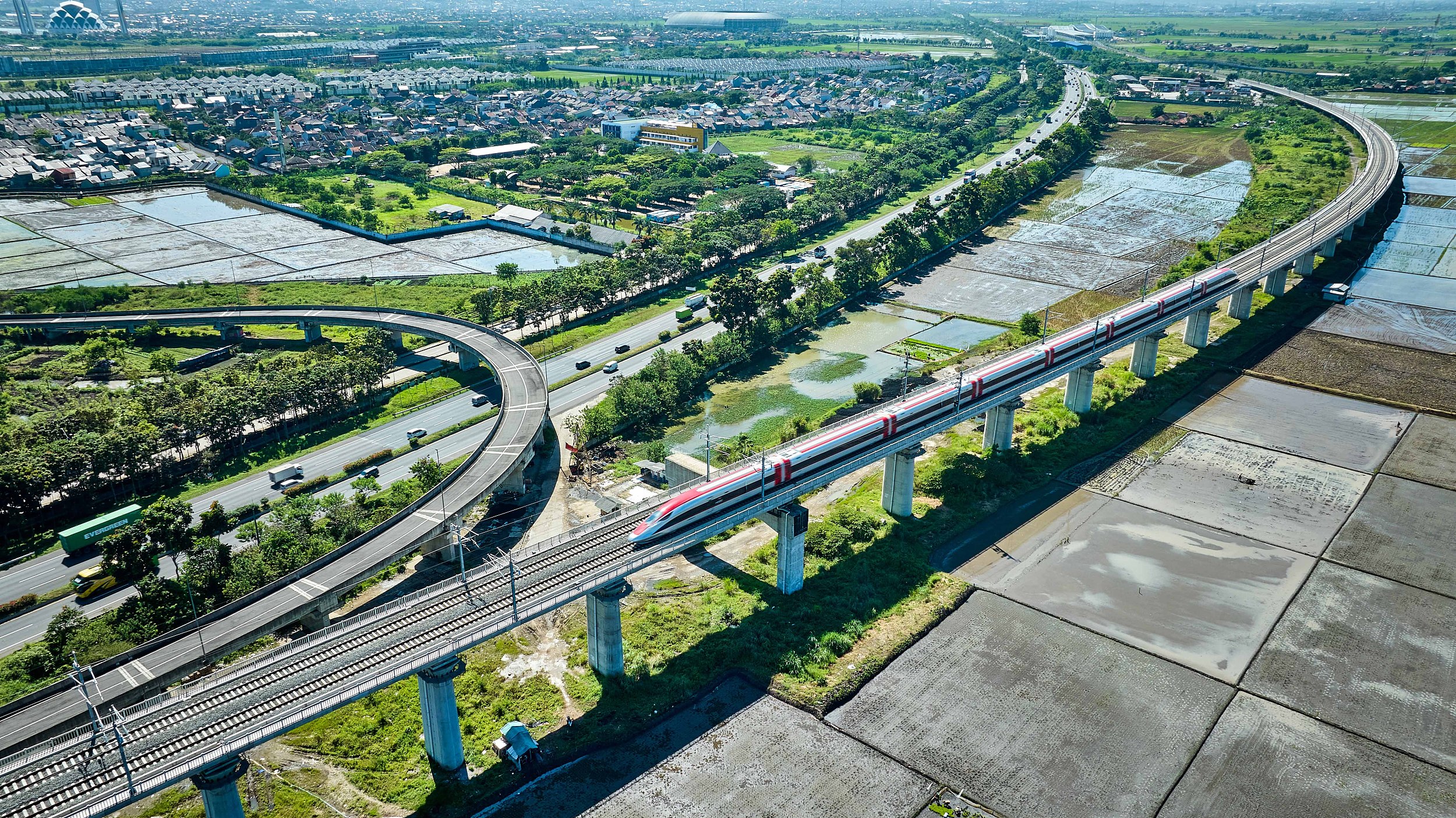
Jakarta-Bandung High-Speed Railway?is a landmark project under the China-proposed Belt and Road Initiative, which connects Indonesia's capital Jakarta and another major city Bandung.?(PHOTO:?VCG)
By?YI Xin
The European Union recently came up with a “de-risking” approach toward China, a policy different from the decoupling advocated by some individuals and organizations in the United States.
But de-risking, in fact, is decoupling in disguise, despite China’s track record showing it stands for peace, growth and innovation and poses no risk to any nation.
Peace Core Element of Foreign Policy
The People’s Republic of China has been a peace-loving country since its founding in 1949. Subsequently, the Five Principles of Peaceful Coexistence became a core element of China’s foreign policy after it was jointly initiated in 1954 by China, India and Myanmar. The five principles are mutual respect for other sovereignty and territorial integrity, mutual non-aggression, non-interference in each other's internal affairs, equality and mutual benefit, and peaceful coexistence.
The Chinese Constitution pledges “a path of peaceful development” and China is the only one among the five permanent members of the UN Security Council, all of whom are nuclear-armed, to pledge no first use of nuclear weapons.
China stands as a force for peace. As President Xi Jinping said, “In advancing modernization, China will neither tread the old path of war, colonization and plunder, nor the crooked path taken by some countries.” Plus steady economic growth and long-term social stability for 1.4 billion Chinese are a safeguard for world peace and security, not a risk.
China is also promoting peace on the global stage. In March, it brokered a pact between historical adversaries Saudi Arabia and Iran, who agreed to reestablish diplomatic relations and reopen embassies in each other’s capital, ending seven years of tensions. The rapprochement opened a new chapter in their bilateral relations and bolstered the recent wave of reconciliation in the Middle East.
To resolve the Ukraine crisis, China has all along advocated peace talks. Following a phone call between President Xi and Ukrainian President Volodymyr Zelensky in April, China’s special envoy for Eurasian affairs Li Hui visited Ukraine, Poland, France, Germany, the EU headquarters in Brussels, and Russia to obtain international consensus for a political settlement. Li said he had in-depth and candid exchanges with all parties, and the visit achieved the “expected goals.”
Global Growth Engine
China is a stabilizer of the world economy. Its contribution to global growth averaged over 30 percent from 2013 to 2021, making it the biggest contributor. In 2022, China’s GDP surpassed 121 trillion yuan ($17.44 trillion), its growth outpacing that of most major economies.
The International Monetary Fund has projected that the Chinese economy will grow 5.2 percent and account for a third of global growth this year. China is a proven key contributor to global growth and a major player in global supply chains, in particular, in the post-COVID era.
With the pandemic and conflicts triggering strong headwinds for the global economy, China has taken effective steps to keep supply chains stable and prevent risks of disruption, proving the strong resilience of its economy. But investing in economic resilience does not mean China is moving away from the vision of shared growth.
China has not closed its door, instead, it has expanded high-quality opening-up. By fostering a better business climate and building a larger market, it hopes to create more opportunities for the world with its own development.
The China International Import Expo in Shanghai demonstrates the commitment to shared growth. Launched in 2018, the annual fair attracted 284 Fortune Global 500 firms last year, and has become a magnet for global participants to exhibit premium products. Hence the logic is simple: If a country decouples from China in the name of de-risking, it will only decouple from cooperation and development.
Hub of Innovation
China is also becoming a leading innovator in a variety of sectors, such as 5G telecom networks, quantum computing and high-speed railway. In the Global Innovation Index published by the World Intellectual Property Organization, China’s ranking has risen steadily for 10 years straight. Last year, it ranked 11th in global innovative performance. In 2022, China’s R&D spending surpassed 3 trillion yuan ($449 billion) for the first time, up 10.4 percent from the previous year.
These innovations are not being done behind closed doors. China has been sharing its technology with its partners worldwide, encouraging global cooperation. To the world, an innovative China is a contributor, rather than a source of risk.
Seeing the huge potential of China’s high-tech industry, some governments are using national security concerns as an excuse to restrict export of critical technologies and equipment to China. Such moves violate market rules and will only impede global supply chains.
Unlike politicians, businesses vote with their feet. Lately, an increasing number of them are setting up not only plants, but also research centers in China. The addition of “innovating with China” to “made in China” is a vote of confidence in China’s innovation environment and market prospects.
In a world fraught with challenges, countries need to come together, not move apart. Many are aware of the costs of moving apart. U.S. Treasury Secretary Janet Yellen said decoupling from China would be “disastrous for both countries.” European Commission President Ursula von der Leyen said decoupling is “clearly not viable, desirable or even practical” for Europe.
It’s time to quit playing with words. To de-risk is to decouple, and to decouple is to destabilize and even derail.
For every beneficiary of globalization, the right thing to do is safeguard global trade and keep supply chains smooth. There is no need to de-risk from China, for a growing China will provide the world with a much-needed boost, not a risk.
(The author is a current affairs commentator based in Beijing)
Large language model, "Huashan", specifically applied in the aerospace field for the first time, was launched at the 2024 China Satellite Application Conference.
